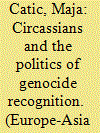|
|
|
Sort Order |
|
|
|
Items / Page
|
|
|
|
|
|
|
| Srl | Item |
| 1 |
ID:
142683


|
|
|
|
|
| Summary/Abstract |
This article examines the evolution and significance of the genocide recognition initiative among Circassians at the turn of the twenty-first century. It argues that, on the most basic level, the Circassian genocide recognition initiative is an identity-driven project, resulting from a fear of extinction that grows out of the experience of being a vulnerable, ethno-national group living with memories of massacres, deportations, exile and fragmentation. Genocide, in effect, becomes a frame used to articulate a seemingly universal Circassian grievance—the fear of extinction—but one that manifests itself in diverse ways on the homeland–diaspora continuum.
|
|
|
|
|
|
|
|
|
|
|
|
|
|
|
|
| 2 |
ID:
136441


|
|
|
|
|
| Summary/Abstract |
In August 2014, as Islamic State jihadists rampaged through Iraq and engaged in genocidal violence against non-Sunni Muslims, they kidnapped over 3000 Yazidi women and girls. A few months earlier, in May, Boko Haram extremists abducted over 200 schoolgirls in northern Nigeria, consistent with their larger and more systematic abduction campaign mirroring the tactics used by Uganda’s Lord’s Resistance Army. In both Iraq and Nigeria, abducted women and girls are believed to have been taken as wives, sex slaves, and/or servants for their captors. Part of a larger, global trend, these most recent episodes suggest an endemic quality to violence against women in zones of conflict and/or state weakness. From Bosnia to Rwanda, from Syria to Congo, and Iraq to Afghanistan, women and girls have become targets of indescribable brutality in the post-Cold War era, including killings, sexual violence, torture, and forced captivity. However, concurrent with these troubling trends of victimization, the last several decades have also seen important gains for women in the sphere of international security. Women have become more prominent in leadership roles at the community, state, and international levels, including in non-traditional spheres such as foreign policy and defence, and in places as diverse as Albania, Bangladesh, and Chile. This “ascent of women,” to borrow Sally Armstrong’s phrase, has also been evident in policy innovations, including UN resolutions on war rape and sexual violence and on women, peace, and security (WPS), reaffirming the important role of women in international security. The rise in prominence of the gender perspective has also challenged alliances like the North Atlantic Treaty Organization to rethink how they engage in military interventions. Although its actions are still modest in scope, the alliance has INVESTED in WPS initiatives and pushed its member states to submit progress reports to track implementation.
|
|
|
|
|
|
|
|
|
|
|
|
|
|
|
|
|
|
|
|
|